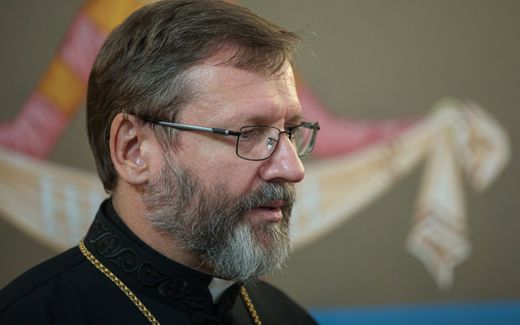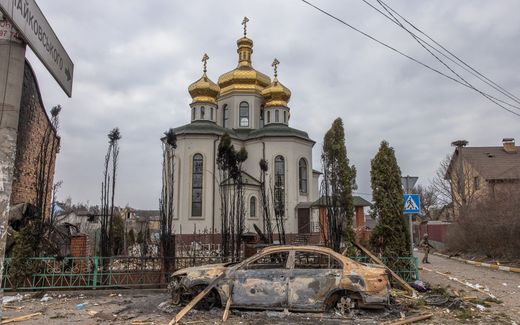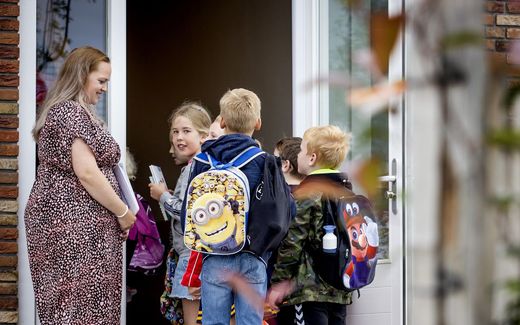War reveals depravity of man
27-04-2022
Western Europe
Hanneke den Hertog, RD
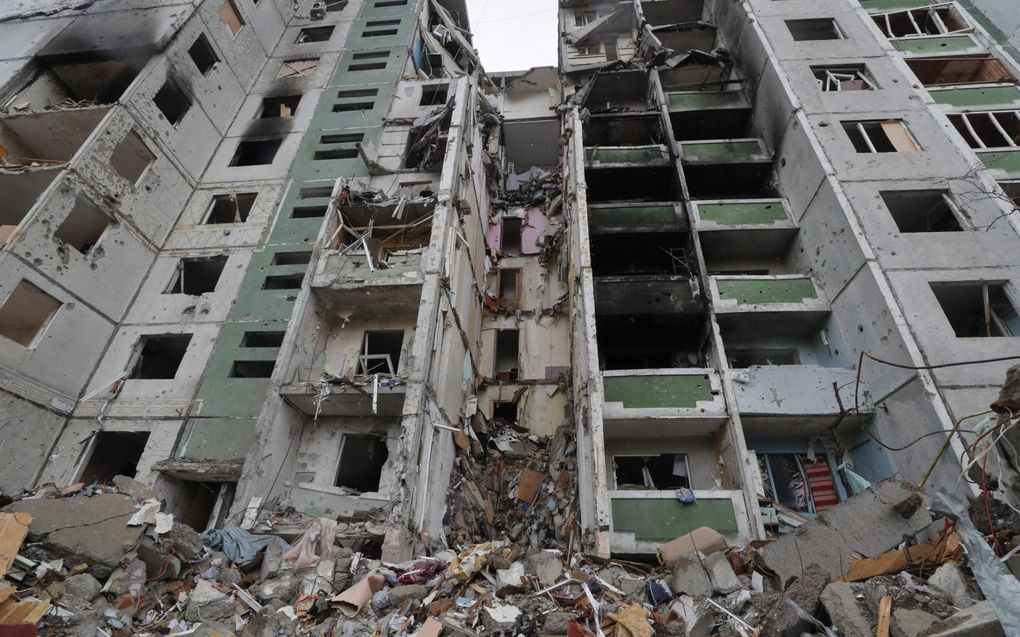
A bombed apartment building in the Ukrainian city of Chernihiv. Deliberately attacking civilian targets is prohibited. image EPA, Sergey Dolzhenko
Western Europe
The execution of defenceless civilians, the rape of women and men, torture of prisoners of war; the war in Ukraine shows the darkest side of mankind. How is it possible that soldiers demonstrate such beastly behaviour?
"Moral compass does not always work"
Protestant army pastor Rev Piet van Duijvenboden takes 'his' soldiers to the concentration camp of Auschwitz once in a while. It is the place where everyone loses any illusions about the goodness of man.
In Auschwitz, where more than a million lives were destroyed, Rev Van Duijvenboden speaks with the soldiers about what power can do to a person. "We talk about the depravity of man, like Lord's Day 3 of the Heidelberg Catechism does. The average soldier realises that he is capable of carrying out horrific acts in extreme circumstances", Van Duijvenboden says in his house in the Dutch town of Apeldoorn.
Since 2008, he has been serving as an army pastor. Currently, he works at the Koning Willem III barracks in his hometown. There he provides about 500 soldiers with spiritual care. He was deployed on a mission four times. The last time was in 2021 when he left for Iraq.
During the missions, the pastor does not carry a weapon. Yet he was fired at. "Something like that boosts your adrenaline level. All your senses are on high alert." In addition to this stress response, which can be lifesaving, diverse emotions can be felt, the pastor says. "Think of anxiety, but also anger."
Rev Van Duijvenboden refers to many clips on YouTube that show Dutch soldiers in the Afghani province of Uruzgan. Cursing and ranting, the soldiers fire at the Taliban. "The adrenaline bursts out of their ears."
The pastor knows from experience that these men do not express such strong language in everyday life. "I see how the behaviour of man changes during a war."
Misbehaviour
We see diverse images of misbehaviour in Ukraine. Pastor Van Duijvenboden points out three possible causes of war crimes.
First, he mentions the compilation of emotions. "A war is frustrating for many soldiers. If the battle takes long, a sense of hopelessness can befall the soldiers. After losing close comrades, they experience a deep sense of grief, anger, and sometimes guilt. In the sense of: I promised him that we would survive together."
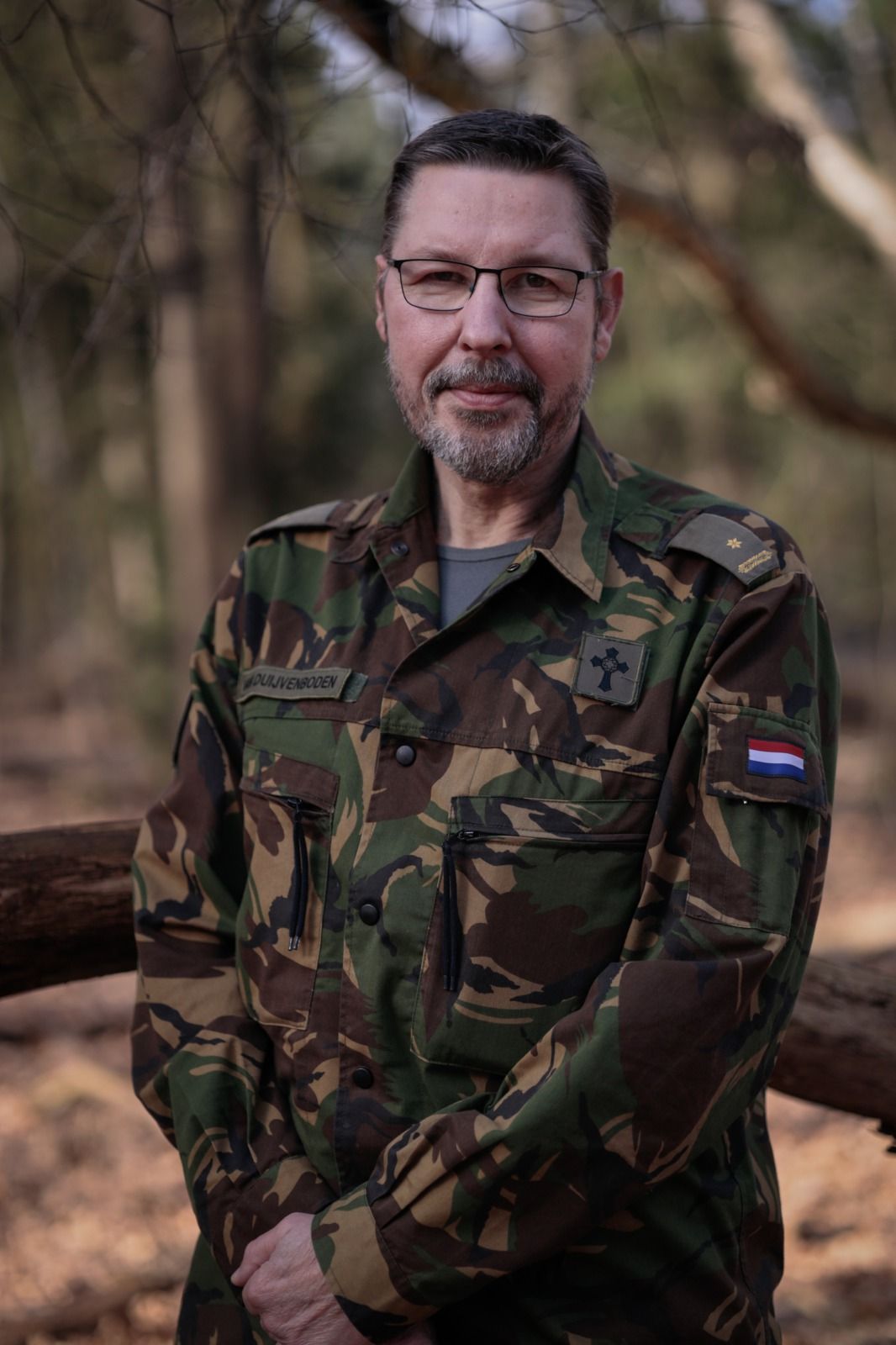
In addition, dehumanisation inevitably takes place, pastor Van Duijvenboden says. "A soldier will distance himself from the enemy. It is the mad, mean enemy who does horrible things and thus has to be eliminated, isn't it? By imagining this picture for yourself, you justify killing the other. In a sense, this dehumanisation of the enemy is necessary. Because if you start thinking about him as a human being, someone's son, husband, father or brother, you will identify yourself with him. In that case, a soldier will not fire when he has to. A pilot will not be able to drop a bomb. On the one hand, this process is necessary; on the other hand, it is dangerous."
Thirdly, pastor Van Duijvenboden mentions power. "When you give someone a weapon, he receives power. When he captures prisoners of war, he has people in his power. And that is disastrous for the fallen children of Adam. Thus, a soldier may kill civilians purely because he has that power. Furthermore, many war criminals are never punished for their acts."
Together, these factors are "hazardous", according to Van Duijvenboden. That people are capable of committing war crimes is evident from several atrocities from history. The pastor refers to My Lai, a Vietnamese town almost completely massacred by American troops in 1968. Women, children, no one was spared. It is estimated that about 350 to 500 people were killed.
"The unit that created this blood bath had already been in Vietnam for months. These boys had encompassed several ambushes and lost about a third of their comrades. In normal circumstances, they would never have committed these murders. Does that acquit them? No. They did carry out these acts. Their moral compass did not work at this crucial moment."
To prevent Dutch soldiers from crossing the moral boundary, much attention is paid to moral education, for example, telling about past excesses. Not only dramatic events like My Lai are talked about but also incidents from Dutch history. "The slogan of pastoral care in the army is: Help a man stay human." We want to teach soldiers how not to be sucked into the dynamics of the moment in war situations."
This moral education is no guarantee for success, Van Duijvenboden realises. "War circumstances cannot be imitated during training. People still violate their moral boundaries, also Dutch soldiers. Despite the models we give them to give them directions in taking ethical decisions."
The army pastor says that faith in God is a "brake on acting immorally", also during war. "Personally, I experience that my conviction that God sees everything and will hold me accountable for my deeds prevented me from committing several sins."
Yet, faith in an all-seeing God is no guarantee for ethical behaviour, Rev Van Duijvenboden knows. He points out that the American unit in My Lai consisted mainly of Christian boys.
Anyway, Van Duijvenboden says, war is “ultimate brokenness. It is impossible to make it a good story."
"People have a disposition for violence"
Researcher prof. Ugur Üngör is not surprised by evidence of war crimes anymore. "Everyone can commit them, also you and I."
According to Üngör, the Russian army left behind a "merciless trace of mass murder" wherever it retreated. The Holocaust and Genocide Studies professor at the University of Amsterdam thinks that this is part of the Russian strategy.
Only then the dead bodies on the streets of Bucha, the bomb on the theatre in Mariupol where civilians were hiding, and the rockets that hit the train station of Kramatorsk are explainable, he says. "When political leaders show that civilian casualties are no problem, soldiers will start to normalise this principle as well."
Üngör suspects that the Russian troops received an order to commit war crimes in Ukraine. However, it is hard to prove that, as doing research in Russia is impossible, according to him. "As a soldier, you have to keep your footing very well to refuse orders. If you don't carry them out, you will have to appear before the court-martial."

Dutch soldiers are not compelled to follow an order that can lead to war crimes. The Russian army does not work very hard to protect civilians, Üngör says. The researcher, connected to the NIOD Institute for War, Holocaust and Genocide Studies, refers to the Russian war strategy in Chechnya, Georgia and Syria. "Russian bombings in Syria caused many more civilian casualties than the terroristic attacks of ISIS."
The suspected war crimes like the ones in Ukraine are thus linked to the attitude of the Russian military command. On the other hand, Russian soldiers are no different from the Rwandese or Germans, Üngör says.
He points out that universal psychological factors play a role as well. "Revenge is an important motivation to breach moral boundaries and unleash your frustration on common civilians. The loss of a comrade can cause one to see red."
Breaking out in violence does not only happen to people who misbehaved in ordinary life as well, the professor says. "Soccer hooligans, who are used to violence, will be more prone to display beastly behaviour. Civilised people often have a more reserved conscience. But they too can commit war crimes, even though it might take a bit longer before they engage in excessive violence."
Üngör did much research on the Armenian Genocide. He does not believe that war crimes can be prevented. Yet, by educating and monitoring an army, abuses can be reduced as much as possible. The expert from Amsterdam thinks that education must be emphasised above all. "They must know what is allowed and what is not." However, he realises that also, in democratic armies, terrible things take place.
"People have a disposition for violence. We are born with fists and teeth. Just add a weapon, and you already have a form of impunity."
When Üngör asks his students who of them would be able to slaughter an animal, most of them deny it. Yet, the professor knows that people can quickly be drawn over their boundaries by force or peer pressure.
According to Üngör, people dislike imagining themselves being capable of committing terrible acts since they have a positive self-image. "War crimes like the ones in Ukraine cause us to doubt that self-image. People ask themselves: "Would I be able to do such a thing? The –uncomfortable- answer is yes."
What is a misdemeanour in war?
One definition of misdemeanour in war is: "Misdemeanor against rules of war". It is the judicial term for the more familiar word "war crime", defined as an "act in times of war that violates the laws of war or combat or fundamental human rights."
A misdemeanour in war can refer to a violation of one of the articles of the Genevan Convention, which forbids torture, hostage-taking, and attacks on the Red Cross. Also, attacking non-military targets on purpose is prohibited.
This article was translated by CNE.news and published earlier by Dutch daily Reformatorisch Dagblad on April 26th
Related Articles


